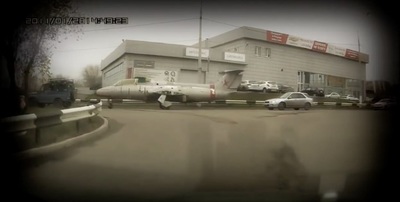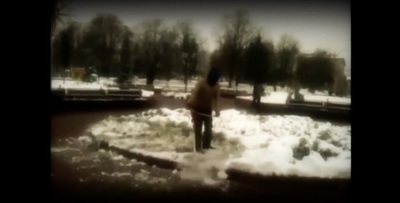| This Fortnight's Post is brought to you by Ksenia Frolova, Doctoral Candidate at the The University of East Anglia, welcome Ksenia! ------------------------------------------------------ From Tyutchev’s poetry to Russian trailers: visualising, representing and poetically critiquing Russian life Who would grasp Russia with the mind? For her no yardstick was created: Her soul is of a special kind, By faith alone appreciated. (Fyodor Tyutchev, trans. by John Dewey) Following up from Ed’s blogpost on Russian trailers, locating the Russian Trailer within the existent trailer scholarship, I want to continue the discussion of Russian Trailers, this time offering cultural and social contexts, in which they are created and consumed. Being a Russian, watching these trailers, the first thought that came to mind was a famous line from a poem written by Fyodor Tyutchev in 1866, but which is still very much relevant, remembered and often quoted by Russians, being a popular maxim: “Умом Россию не понять” or “Who would grasp Russia with the mind?” Moreover, I believe that it is particularly this idea that is behind ALL Russian Trailers, because the footage used in them is from the unimaginable, the insane, yet it comes from video eyewitnesses and is therefore more than real and possible. I would go even further arguing that similar to the political subcontext of Tyutchev’s poetry, Russian Trailers are also highly political in nature; by no means celebratory, as it was suggested by Ed, but on the contrary they are, for me, critical, cynical and ultimately sad. What I agree with, however, is Ed’s description of these trailers as the “unique phenomena”, because they do not line up with most of the existent literature on fake and fan trailers or fan creations in a broader sense. They do not “perform and embody users' and fans' desire to see not just the feature film but also the official trailer itself” (Williams, 2012) and there is no sense of fans’ cinematic anticipation or appreciation (Jenkins, 2006). The trailers’ connection to the original film is minimal, as it will be discussed further in this article, with the film being the means, rather than the motivation. This potentially challenges how we understand trailers and cinema, though such discussion goes beyond the scope of this particular blogpost. Russian trailers further distance the concept of a trailer from cinema and advertising; they reflect the importance of the format of a trailer that goes beyond its initial understanding; and require us to re-visit the issues and concepts around trailer, fandom, narrative and interactivity (Johnston, 2008). Russian trailers, which currently can only be found on YouTube, have an apparently unique relationship with its online audience. On the one hand, they rely on amateur footage uploaded to YouTube for its montaged content, and on the other hand they are also a major source of discussion and argument among YouTube viewers. The sheer volume of the comments, with some videos receiving 500+ comments, points to the “popularity” of the format. Comment threads for the majority of Russian trailers present a form of a heated argument, with users usually occupying one of two sides: those who find the videos “f#*%ing funny” and celebrate the “maker” of the video and his or her “talent”, and those who are embarrassed by them and can’t understand why someone would film something like this, let alone montage it. The first group of comments is almost impossible to translate due to the peculiarities of Russian swear words, however, the comments from the other side of the argument are quite interesting in their tone and message, as well as having serious intentions, rather than comic, initiating a deeper discussion of the videos and their meanings. |
One of the first comments to the ‘Interstellar Russian trailer’ reads as “рашка такая
рашка”, which can be translated as “Russia is so Russia”. However, instead of using the word “Russia”, the user has chosen a slighting word “Russka”, which is a derogatory slang word derived from the word “Russia”, which Russians use when describing Russia’s problems, and particularly when the media highlights an unfavourable aspect of Russian life. This comment is interesting, as it has set the tone for the following discussion, with many users using the word “Russka” in the following comments. One user commented: “People make the country. Those who live in Russka are ashamed of it, and those who live in Russia are proud of it”, indicating a painful contradiction felt by many Russians, who simultaneously love and hate, are proud and ashamed of their own country and fellow citizens.. Some of the comments are also highly sarcastic, with users writing things like “Glory to the great Russia!” or “This video is very thought provoking… It made me think about how many idiots we have in this country!”
However, it is not only the comments, but the footage itself that can be seen as offering a social and political critique. Russian trailers appear to address social issues, such as lack of laws and rules or their total disregard, alcoholism, unemployment and underdevelopment of many areas outside big cities and people who occupy them, who lack education, culture and have no work prospects, which often links back to alcoholism, making it a vicious circle of social inequality and injustice. The videos also often address other peculiarities of Russian life, such as extreme weather conditions, for instance, and what people have to do to cope with them, often on their own, with no support from local councils. The images below from the Interstellar - Russian trailer illustrate this further:
рашка”, which can be translated as “Russia is so Russia”. However, instead of using the word “Russia”, the user has chosen a slighting word “Russka”, which is a derogatory slang word derived from the word “Russia”, which Russians use when describing Russia’s problems, and particularly when the media highlights an unfavourable aspect of Russian life. This comment is interesting, as it has set the tone for the following discussion, with many users using the word “Russka” in the following comments. One user commented: “People make the country. Those who live in Russka are ashamed of it, and those who live in Russia are proud of it”, indicating a painful contradiction felt by many Russians, who simultaneously love and hate, are proud and ashamed of their own country and fellow citizens.. Some of the comments are also highly sarcastic, with users writing things like “Glory to the great Russia!” or “This video is very thought provoking… It made me think about how many idiots we have in this country!”
However, it is not only the comments, but the footage itself that can be seen as offering a social and political critique. Russian trailers appear to address social issues, such as lack of laws and rules or their total disregard, alcoholism, unemployment and underdevelopment of many areas outside big cities and people who occupy them, who lack education, culture and have no work prospects, which often links back to alcoholism, making it a vicious circle of social inequality and injustice. The videos also often address other peculiarities of Russian life, such as extreme weather conditions, for instance, and what people have to do to cope with them, often on their own, with no support from local councils. The images below from the Interstellar - Russian trailer illustrate this further:
Russian trailers are a mash up of footage taken from multiple sources, united and structured by the conventional cinematic trailer format and a dramatic soundtrack, which is always a voiceover borrowed from an official trailer for a specific film (official trailer for the Russian market, where the original English trailer is translated and adopted into Russian). The format of the trailer works very well for such mash up: best bits of amateur footage are montaged in the fast-paced manner, being brought together to tell a story, however, similar to critiques of cinematic trailers, these stories are quite vague, without giving too much away (cf Johnston, 2008).
The choice of films is not accidental either, the voiceover is usually uniquely linked to the theme and tone of the video, helping to develop the narrative and make sense of the onscreen action. To demonstrate this on the example of Interstellar Russian Trailer, the voiceover is the following (in Russian): “We've always defined ourselves by the ability to overcome the impossible. And we count these moments. These moments when we dare to aim higher, to break barriers, to reach for the stars, to make the unknown known. We count these moments as our proudest achievements. But we lost all that. Or perhaps we've just forgotten that we are still pioneers. And we've barely begun. And that our greatest accomplishments cannot be behind us, because our destiny lies above us”. The connection of the voiceover, which is also a quote from the main character in the film from – Cooper, was strongly felt by some viewers, with one YouTube user saying: “We were proud of Gagarin going to space, the WWII victory, the beauty of our boundless motherland… What is happening, what is all this?” The voiceover thus ties all of the videos together and gives them a meaning; the video can be analysed as posing a rhetorical question of what can Russians be proud of now, when all the accomplishments of the Soviet Union are being left far behind, with only social inequalities, poverty and unruliness remaining in their place. However, the way this question is posed is very subtle, it is hidden behind the seemingly obvious image, and is not apparent to everyone, which makes these ugly videos uniquely poetic.
Works cited:
Jenkins, Henry (2006) Convergence Culture: Where Old and New Media Collide. New York: New York University Press
Johnston, Keith M. (2008) ‘‘The Coolest Way to Watch Movie Trailers in the World' Trailers in the Digital Age’. Convergence, Vol. 14(2), pp. 145-160
Williams, Kathleen Amy (2012) ‘Fake and fan film trailers as incarnations of audience anticipation and desire’. Transformative Works and Cultures, Vol. 9, available at: http://journal.transformativeworks.com/index.php/twc/article/view/360/284 [Accessed on 21/09/2015]
The choice of films is not accidental either, the voiceover is usually uniquely linked to the theme and tone of the video, helping to develop the narrative and make sense of the onscreen action. To demonstrate this on the example of Interstellar Russian Trailer, the voiceover is the following (in Russian): “We've always defined ourselves by the ability to overcome the impossible. And we count these moments. These moments when we dare to aim higher, to break barriers, to reach for the stars, to make the unknown known. We count these moments as our proudest achievements. But we lost all that. Or perhaps we've just forgotten that we are still pioneers. And we've barely begun. And that our greatest accomplishments cannot be behind us, because our destiny lies above us”. The connection of the voiceover, which is also a quote from the main character in the film from – Cooper, was strongly felt by some viewers, with one YouTube user saying: “We were proud of Gagarin going to space, the WWII victory, the beauty of our boundless motherland… What is happening, what is all this?” The voiceover thus ties all of the videos together and gives them a meaning; the video can be analysed as posing a rhetorical question of what can Russians be proud of now, when all the accomplishments of the Soviet Union are being left far behind, with only social inequalities, poverty and unruliness remaining in their place. However, the way this question is posed is very subtle, it is hidden behind the seemingly obvious image, and is not apparent to everyone, which makes these ugly videos uniquely poetic.
Works cited:
Jenkins, Henry (2006) Convergence Culture: Where Old and New Media Collide. New York: New York University Press
Johnston, Keith M. (2008) ‘‘The Coolest Way to Watch Movie Trailers in the World' Trailers in the Digital Age’. Convergence, Vol. 14(2), pp. 145-160
Williams, Kathleen Amy (2012) ‘Fake and fan film trailers as incarnations of audience anticipation and desire’. Transformative Works and Cultures, Vol. 9, available at: http://journal.transformativeworks.com/index.php/twc/article/view/360/284 [Accessed on 21/09/2015]






 RSS Feed
RSS Feed